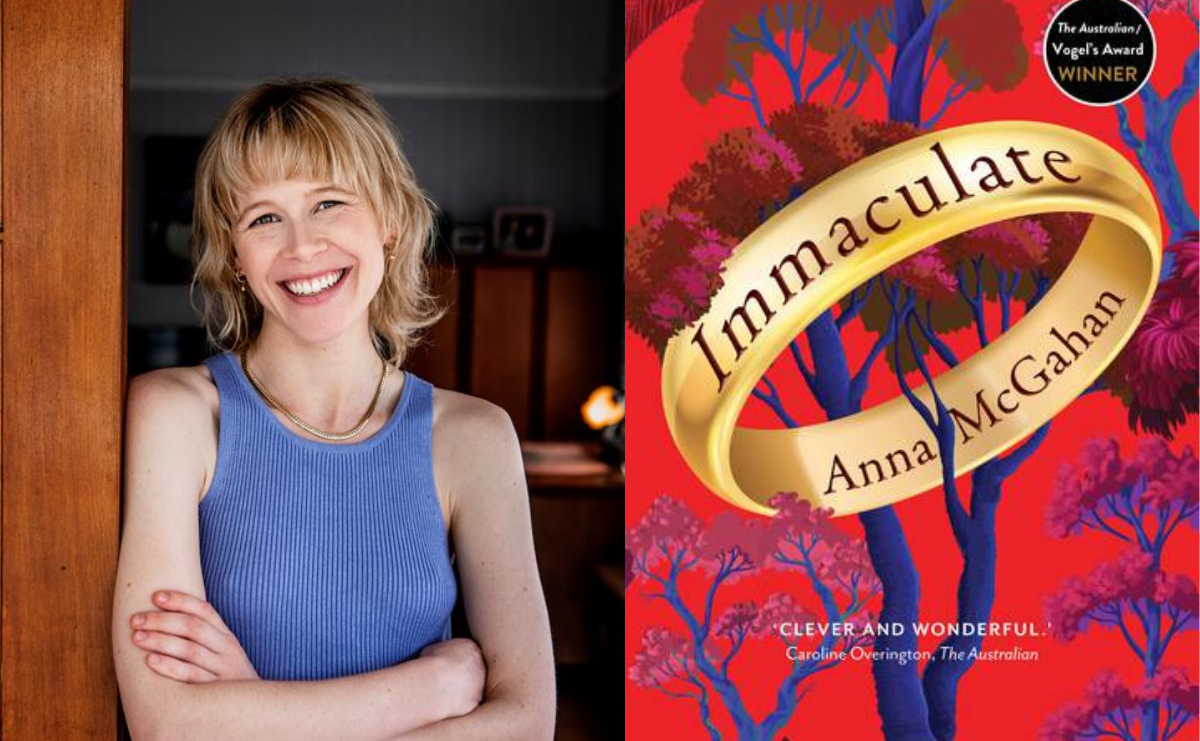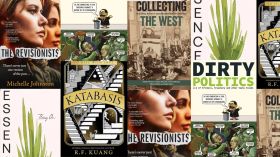Anna McGahan was the 2023 winner of The Australian/Vogel Literary Award for young writers under the age of 35. Her entry – a novel titled Immaculate – carries with it a sense of determination. ‘When I decided to write this,’ McGahan notes in her acknowledgements, ‘I did not write it for any other reason but to survive.’ This feeling of resolve is tightly bound into Immaculate; an urgent strength fuels the novel, and with it delivers a strong piece of fiction.
Frances is beset by catastrophe – or, rather, she is tensed under the weight of numerous pressures. She has separated from her misogynistic husband, Lucas, after experiencing a spiritual crisis when their young daughter, Neve, became terminally ill. Frances is also struggling with her burgeoning sexuality, having repressed her queer identity after converting to an evangelical church in her early twenties. These three threads – faith, grief and sex – run through Immaculate, and McGahan is skilled in the ways in which she braids them together.
Set in Brisbane, McGahan’s narrative is composed of fragments. Twisting between the primary voice of Frances, and the secondary chorus of Mary – a pregnant teenager followed by a seemingly-preternatural stray dog – Immaculate uses the detritus of everyday life to convey its events. The reader is presented with payment summaries, Instagram posts, letters, emails, police transcripts and message notifications – all of which move to form the broad sweep of the novel, which tracks forwards and backwards in its temporal narrative flow.
McGahan writes that Immaculate is ‘a fairy tale’, but one that is ‘not for children.’ This feels like an apposite articulation of how her novel speaks to fantastical escapism as a form of psychological survival. The moments when the narrative sheds its skin and slips into the fantastic are important points of entry into the schisms Immaculate attempts to encapsulate. The scenes of fantastical escape nod to a range of literary texts that play with this dynamic, not least Hans Christian Andersen’s The Little Match Girl, which finds its way directly into Immaculate’s pages – an interesting intertextual mirroring of how the novel works to represent a manifold chorus of voices.
Immaculate is strongest when it leans into examining how love moves: how it grows, and how it turns bitter. Frances’ narrativisation of her marriage to Lucas explores how abusive relationships can become simultaneously constrictive and addictive. ‘He was so direct,’ Frances tells us of Lucas, ‘so unexpectedly sharp in a room full of softness. I was attracted to Lucas’ sharpness, then. It reminded me I was alive.’ It is only later that Frances realises that this keenness carries with it a wound. ‘I did not know it would press deeper into my skin with every passing day,’ she says, ‘until I woke up sliced in two.’
Yet McGahan also gives us a window into hope. Frances’ brushes with Ruairí, a ‘luminous, camp and intoxicating’ non-binary actor, and Celine, a ‘wild and large and tattooed’ sex worker, are moments of queer joy that help to float the novel. They are counterpoints to the heaviness of Frances’ dealings with Lucas, and her terrible anguish at Neve’s suffering.
Read: Book review: The Days Toppled Over, Vidya Madabushi
McGahan’s novel is ambitious: it is fuelled by a sense of urgency. Immaculate offers its readers an insight into profound grief – but also, folded within it, an examination of hope and of survival.
Immaculate, Anna McGahan
Publisher: Allen & Unwin
ISBN: 9781761067990
Pages: 400pp
Publication Date: 20 June 2023
RRP: $32.99






